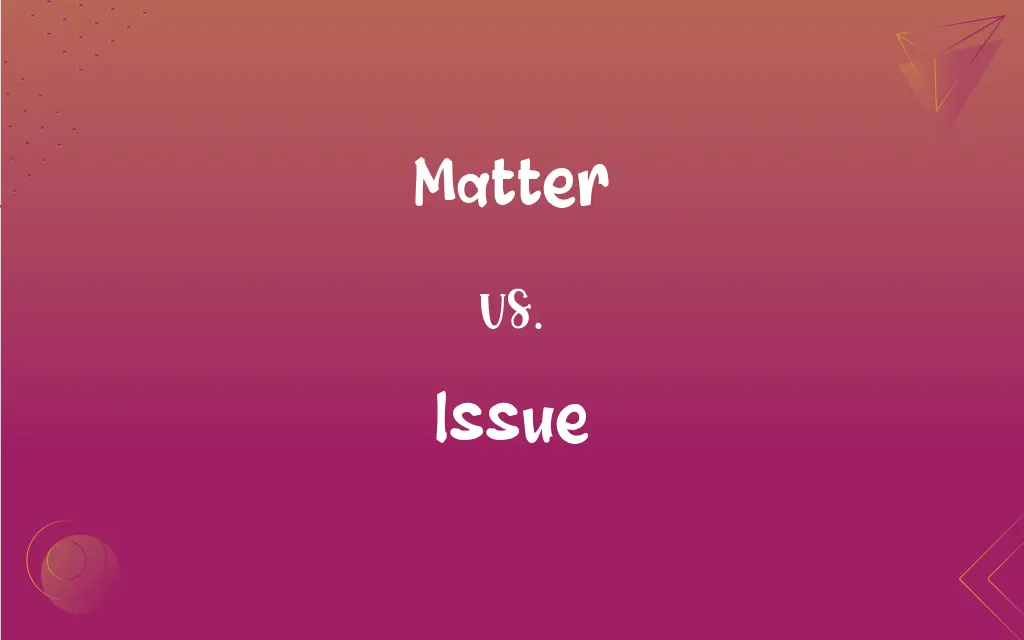Matter vs. Issue: What's the Difference?
Edited by Janet White || By Harlon Moss || Updated on November 10, 2023
Matter refers to a subject or topic under consideration, while an issue is a problem or a point of debate or dispute.

Key Differences
Matter is a broad term that can refer to any subject or topic, not necessarily implying a problem or conflict. An issue, however, specifically denotes a problem, dispute, or point of contention that requires resolution.
In discussions, a matter could be any topic of interest or relevance, encompassing a wide range of subjects. While, an issue usually refers to something that needs to be addressed or resolved, often involving disagreement or debate.
Matters can be neutral, positive, or negative in nature, covering general topics. Whereas, issues are typically associated with challenges, problems, or conflicts that need attention.
A matter can be an item of discussion in various contexts, from casual conversations to formal meetings. Conversely, an issue often implies a need for action or decision-making, focusing on resolving a problem or disagreement.
Matters can be theoretical, practical, or abstract, and do not necessarily require immediate action. On the flip side, issues usually denote more urgent or problematic topics that demand solutions or interventions.
ADVERTISEMENT
Comparison Chart
Definition
A subject or topic under consideration
A problem, point of debate, or dispute
Implication
Can be neutral, positive, or negative
Typically associated with challenges or problems
Nature of Discussion
Broad range of subjects
Specific problems or disputes
Contextual Use
General discussion, various contexts
Requires action or resolution
Urgency and Action
Not necessarily urgent, diverse in nature
Often urgent, demanding solutions
ADVERTISEMENT
Matter and Issue Definitions
Matter
A subject or topic of consideration.
The matter of funding was discussed at the meeting.
Issue
A problem or point of dispute.
The main issue is the lack of resources.
Matter
A particular situation or issue.
We will address the matter later.
Issue
A topic of public interest or concern.
Environmental issues are gaining more attention.
Matter
A substance or material of a specific kind.
Dark matter remains a mystery in physics.
Issue
A point in question or debate.
The issue of privacy is frequently debated.
Matter
An item or aspect of interest.
The environmental matter concerns many people.
Issue
A result or outcome of a process.
The latest issue of the magazine features health topics.
Matter
Something of importance or relevance.
Your opinion on the matter is crucial.
Issue
The act of supplying or distributing something.
The company will issue a refund to affected customers.
Matter
That which occupies space and has mass; physical substance.
Issue
A point or matter of discussion, debate, or dispute
What legal and moral issues should we consider?.
Matter
A type of such substance
Organic matter.
Issue
A matter of public concern
Debated economic issues.
Matter
Discharge or waste, such as pus or feces, from a living organism.
Issue
A misgiving, objection, or complaint
Had issues with the plan to change the curriculum.
Matter
(Philosophy) In Aristotelian and Scholastic use, that which is in itself undifferentiated and formless and which, as the subject of change and development, receives form and becomes substance.
FAQs
Can a matter be theoretical?
Yes, matters can be theoretical or abstract.
Do issues require resolution?
Yes, issues typically need to be addressed or resolved.
Is a matter always a problem?
No, matters are not always problematic.
Are issues always problems?
Generally, issues refer to problems or points of contention.
Can issues be personal?
Yes, issues can be personal, public, or organizational.
Can issues be minor?
Issues can range from minor to major in significance.
Can a matter be a positive topic?
Yes, matters can be positive, neutral, or negative topics.
Are issues always urgent?
Issues often have a sense of urgency, especially in need of resolution.
Is every matter a subject of debate?
Not necessarily, matters can be simple topics of discussion.
Can matters be resolved?
Yes, matters can be resolved, though not all require resolution.
Is the term matter used in law?
Yes, in legal contexts, matter refers to a case or subject under consideration.
Is an issue a topic for discussion?
Yes, issues are often topics of discussion, especially for problem-solving.
Are matters always discussed?
Matters are commonly discussed, though not necessarily in formal settings.
Are all matters urgent?
No, matters vary in urgency and importance.
Do issues need decision-making?
Yes, issues typically require decisions or actions.
Do issues imply disagreement?
Often, issues involve some level of disagreement or debate.
Can a matter be a physical substance?
In scientific contexts, matter refers to physical substances.
Can a matter be a topic in a meeting?
Yes, matters are often items on meeting agendas.
Can issues be political?
Yes, issues can be political, social, economic, or personal.
Is resolving issues a part of management?
Yes, resolving issues is often a key part of organizational management.
About Author
Written by
Harlon MossHarlon is a seasoned quality moderator and accomplished content writer for Difference Wiki. An alumnus of the prestigious University of California, he earned his degree in Computer Science. Leveraging his academic background, Harlon brings a meticulous and informed perspective to his work, ensuring content accuracy and excellence.
Edited by
Janet WhiteJanet White has been an esteemed writer and blogger for Difference Wiki. Holding a Master's degree in Science and Medical Journalism from the prestigious Boston University, she has consistently demonstrated her expertise and passion for her field. When she's not immersed in her work, Janet relishes her time exercising, delving into a good book, and cherishing moments with friends and family.































































